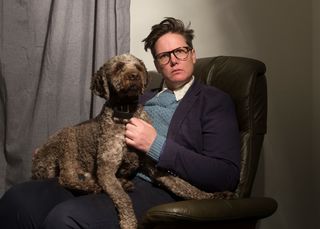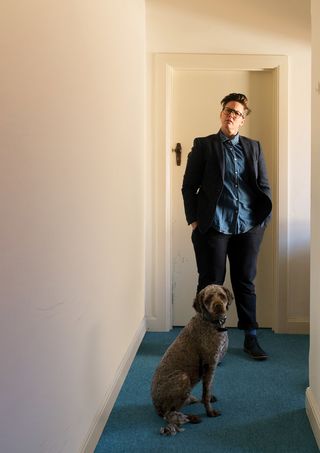Autism
Hannah Gadsby's Douglas Is Our Nanette
Gadsby raises her voice as an autistic woman.
Posted September 6, 2019 Reviewed by Ekua Hagan

In 2018, Hannah Gadsby became internationally known with the masterfully curated oratory, Nanette. Her veracious account of marginalization and sexual assault resonated with people across the globe. She described experiences that so many women can (sadly) relate to, and her frankness and authenticity, while rather disarming at points, was also refreshing.
The autistic voice in Nanette
In 2017, in the midst of the rise of the #MeToo movement, an Australian TV personality used Asperger’s Syndrome to explain away his alleged sexual misconduct. In response to this, Gadsby posted publicly on Facebook, expressing discord at the suggestion that neurodivergence is in any way linked to perpetrating sexual assault. In the same post, she also quietly disclosed that she is autistic, stating that she had been informed by a professional that her “brain qualified for membership in club spectrum."
Like Gadsby, both authors of this article are late-diagnosed autistic women. We saw Gadsby’s 2017 Facebook post (aptly foreshadowing the content in both Nanette and Douglas), and while her voice was bellowing about abuse of power, it was her whispered disclosure that spoke loudly to us as fellow members of “club spectrum."
When we saw Nanette, we felt the same gut-wrenching blows that others did. Her narrative of feeling silenced and invisible evoked a visceral response. However, recalling her subtle disclosure, we also heard a distinctly autistic voice in Nanette; it was overwhelmingly evident in her intricate analysis and deftly scripted delivery. Gadsby’s penchant for wordplay was familiar to us, as was the way she dissected the subject of her narrative and reassembled it to present a new perspective. She recounted detailed information about her passionate interests and described having successfully weaponized that information to counter ignorance and insensitivity. We waited for her to put words to her neurodivergence, her way of being in the world so similar to our own, yet the words did not come.
…and then came Douglas
Following the success of Nanette, the world awaited Gadsby’s next move with bated breath. When Douglas was announced, she seemed intentionally vague in her media appearances. We both speculated as to whether she might disclose her autism diagnosis as the incendiary that would be expected after a poignant show like Nanette. We both hoped that she would take the whispered disclosure about “club spectrum” and turn it into a roar.
And she did.
In Douglas, Gadsby talks honestly about autism. She discusses both the challenges and strengths that come with being autistic. She describes the difficulties of her pre-diagnosis experience of cognitive dissonance and lacking an understanding of herself. In the way that women across the world found validation in Nanette, we embraced Douglas because it offered an authentic narrative about the autistic experience like nothing we had seen before. It was empowering, validating, affirming. Finally, there was someone in the global spotlight talking from lived experience about being an autistic woman.

Why does the mainstream media still speak in whispers about Gadsby’s autism diagnosis?
There has been no shortage of media attention around Douglas and Gadsby’s few formal media appearances have included prominent platforms. While autism is a core element of Douglas, most reviewers and journalists have instead focused on the sharp humor and analysis that Gadsby employs to bookend a more profound subject.
It sometimes feels like the media is tiptoeing around the matter, speaking in hushed tones. Like Gadsby’s initial disclosure, the media's reaction is whispered. Most reviews mention autism in passing or gloss over it on their way to discussing more lighthearted matters, like whether Gadsby will meet Beyoncé at the Emmys. One writer went to great lengths to avoid using the word "autism," employing the term “neuro-atypical diagnosis."
Hannah Gadsby has been bold enough to stand on stage and candidly tell her story. She has chosen to move from whispering about “club spectrum” to stridently, articulately, and vociferously talk about her experience as an autistic woman. This deserves to be validated, for the mainstream media to match the boldness with which Gadsby makes her diagnostic disclosure and place it front and center in the press, just as Gadsby places it front and center in Douglas.
The power of watching an autistic woman loudly and proudly speaking her truth
As autistic women ourselves, the navigation around disclosure presents challenges, particularly in a professional context. Our work (as a clinical psychologist and academic, respectively) involves nuanced communication, an area frequently assumed to be lacking, rather than different and varied, the moment the word "autism" is mentioned. Autism is also commonly conflated with co-occurring conditions such as intellectual disability and mental health conditions. In spite of our shared and strongly held belief that being autistic brings significant strengths to our work, disclosing in a professional setting presents the risk of vulnerability; of being dismissed, compromised, or undermined.
Despite the risks, we feel strongly that we must situate ourselves authentically in order to work to our full potential. Our commitment to bringing justice to our practice, also characteristic of our neurotype, drives us to believe that concealing our autistic identities is a disservice to the clients and students for whom we strive to provide an inclusive and supportive environment.
Gadsby relates her experience of late diagnosis, explaining that it facilitated a reframing of her own personal narrative, a process which is also familiar to us. In re-examining our own experiences post-diagnosis, we too went from cautious to candid in discussing autism. This shift also brought an increase in well-being and improved mental health, as accepting one’s autistic identity and its centrality is tantamount to accepting oneself.
Douglas is currently touring internationally and is set to reach a broad audience via Netflix in 2020. To see an autistic woman on the world stage, speaking honestly and openly about the autistic experience, is unprecedented. Gadsby is the authentic, articulate autistic voice that we have yearned for, and that the world needs to hear. We hope that autistic women can draw strength from Gadsby’s courage; to raise our collective voice from a whisper to a roar.




